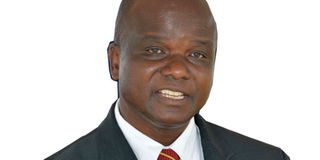Sustaining HIV/Aids financing amid other national priorities

Nelson Musoba is the Ag Director General, Uganda Aids Commission
If the current efforts in local resource mobilisation for HIV/Aids work in Uganda are sustained, the country will very soon be able to provide quality drugs and interventions to all those that need them, making our target of ending HIV/Aids by 2030 achievable. HIV programmes in Uganda remain largely funded by donors, but going forward, they will increasingly have to be funded through domestic sources. Recent records show that although the government has been increasing its contribution to the epidemic, more than 68 per cent of the spending for the national response comes from Aids Development Partners, 20 per cent from out of pocket (families), 11 per cent from the government and 1 per cent from the private sector.
Currently, the rising HIV programme costs to meet increased treatment targets as the epidemic matures within a landscape of shrinking donor support for HIV, is a reality for many low and middle-income countries. The key question that many countries are grappling with, including Uganda, is how can sustainable funding towards HIV be guaranteed in light of competing public priorities, substantial current investments towards HIV and a backdrop of declining external funding towards HIV? The Uganda Aids Commission working with key stakeholders, has developed a resource mobilisation strategy that proposes various approaches to mobilising local resources, including increased government allocation for health and HIV/Aids, innovative approaches like levies, efficiency savings by exercising frugality with available resources, and development partner contributions.
In order to respond to the challenges faced in realising sustainable, domestic financing for HIV/Aids, the Parliament in July 2014 passed an HIV/Aids Prevention and Control Act, which provides for the establishment of the Aids Trust Fund. The purpose of the Fund is to secure a predictable and sustainable means of procuring goods and services for HIV/Aids counseling, testing and treatment.
The monies of the Fund shall consist of: 2 per cent of the total tax revenue collected from levies on beers, spirits or waragi, soft drinks, and bottled water; tax revenue from any other taxable item as may be identified by the Finance minister from time to time; grants, monies or assets donated to the Fund through the Finance minister or assets donated to the Fund by any foreign government, international agency or external body of persons, corporate or unincorporated; or money received by the Fund by way of voluntary contributions. The regulations are currently being reviewed by Parliament and once approved, will provide a basis for operationalising the Fund.
Apart from the Aids Trust Fund, the private sector recently launched a strategy of raising local resources for HIV/Aids work – the One Dollar Initiative. The initiative is now mobilising businesses and individuals to raise local resources as the only sustainable way of supplementing government’s efforts in this sector. We all need to be reminded that fighting HIV is not a charity action, but an investment. This is why both the private sector and government must share the responsibility as a public good.
Within this effort of local resource mobilisation, we need to be reminded that the ongoing efforts in funds mobilisation for HIV/Aids work can no longer be sufficient without parallel positive results and increased efficiency in their use. Improving efficiency is about preventing more new infections and saving more lives by doing the right things for the right populations as well as delivering quality services at the lowest cost.
Uganda Aids Commission will soon release a new efficiency study that shows that considerable resources spent on HIV/Aids work are still being wasted through leakages, inefficient combinations of interventions, and sub-optimal use of medicines and human resources.
Through the recently launched Presidential Fast Track Initiative on Aids, the President seeks to ensure a “value for money” HIV/Aids work.
Dr Musoba is the Ag Director General, Uganda Aids Commission.




